2025年人教新目标中考英语复习 语法选择(培优) 课件
文档属性
| 名称 | 2025年人教新目标中考英语复习 语法选择(培优) 课件 |

|
|
| 格式 | pptx | ||
| 文件大小 | 847.4KB | ||
| 资源类型 | 试卷 | ||
| 版本资源 | 人教新目标(Go for it)版 | ||
| 科目 | 英语 | ||
| 更新时间 | 2025-04-20 00:00:00 | ||
图片预览

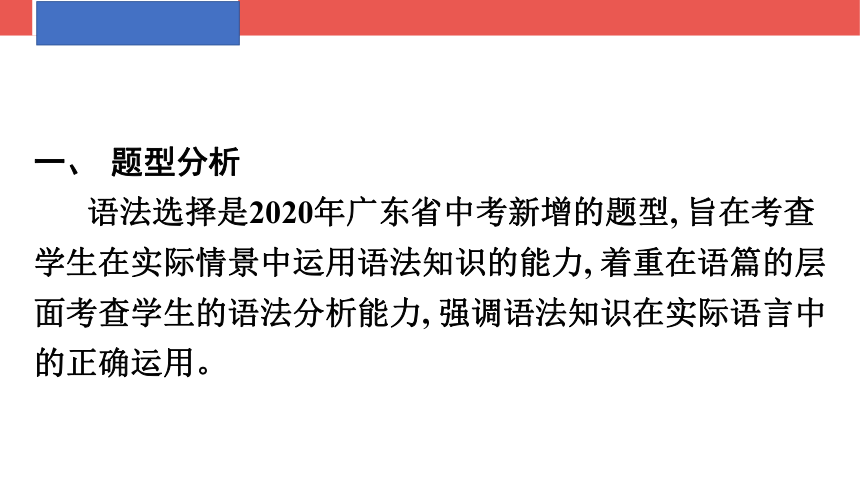
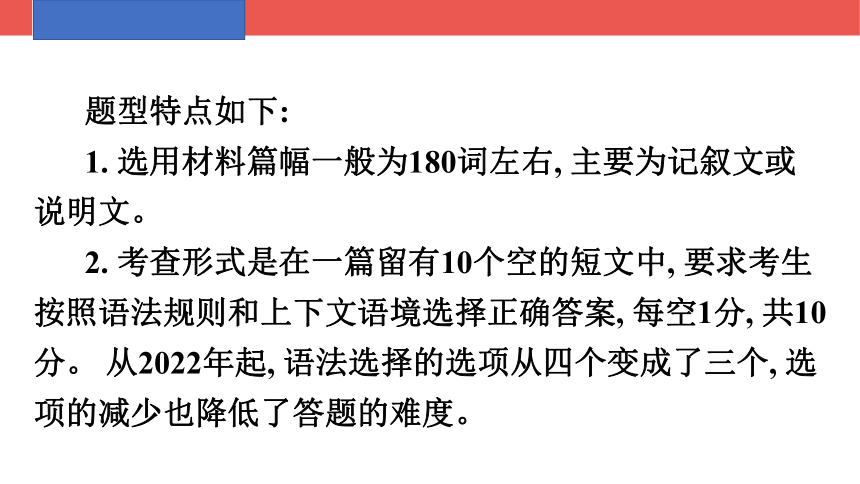
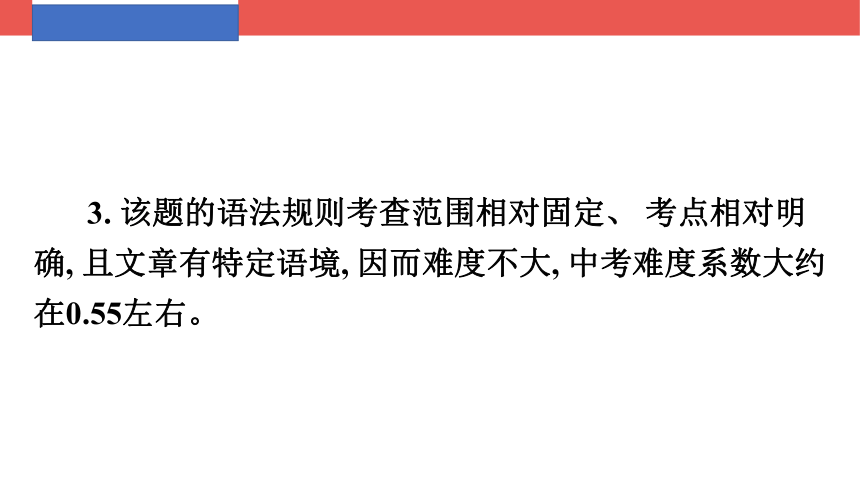
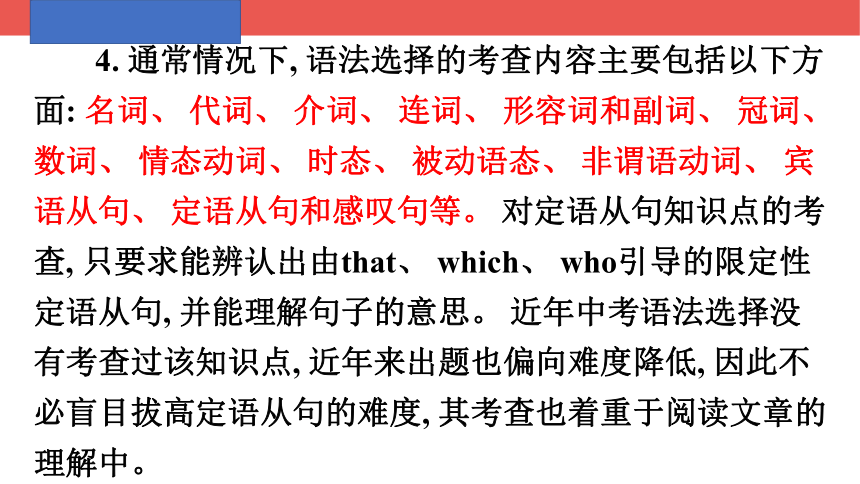
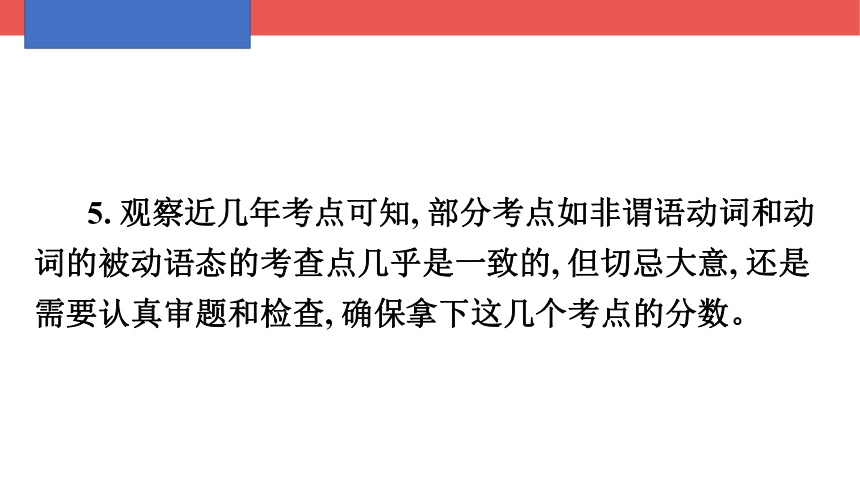
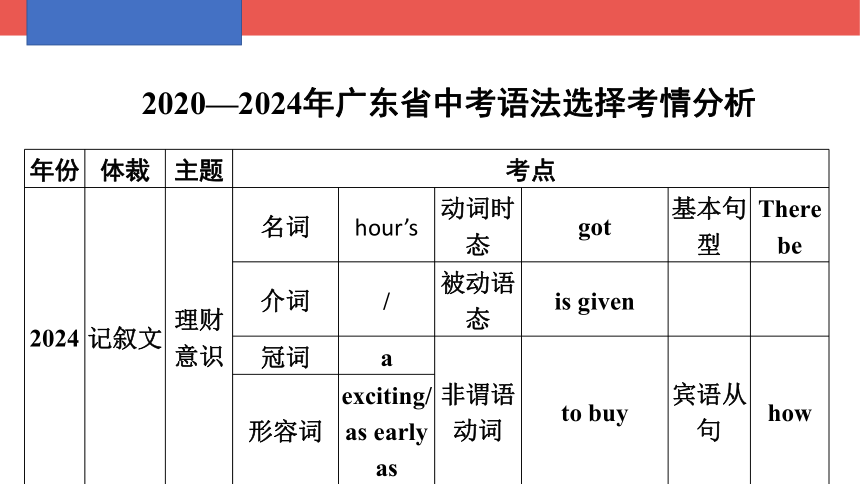
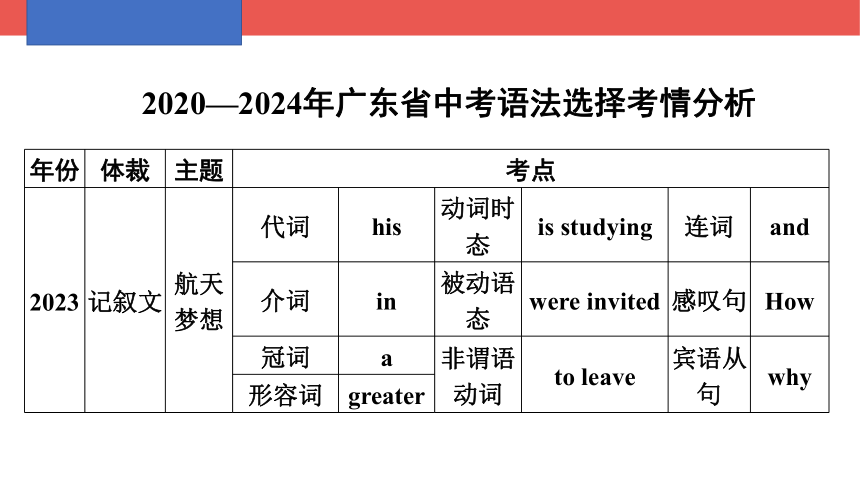
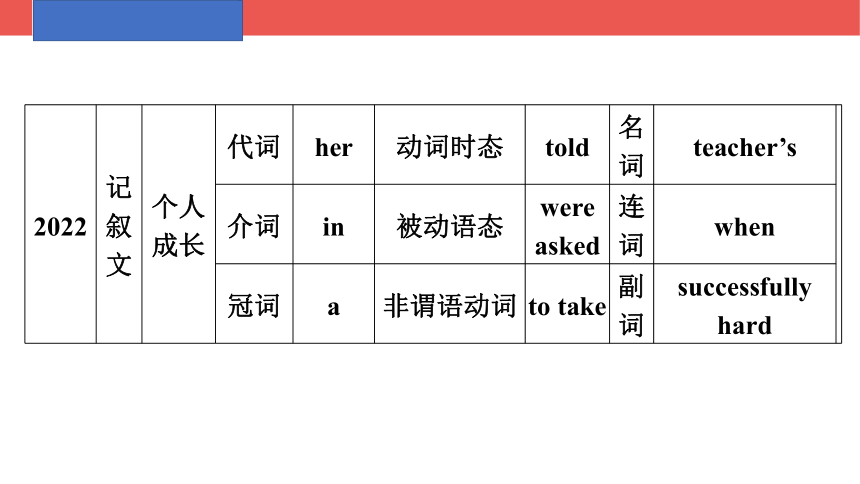
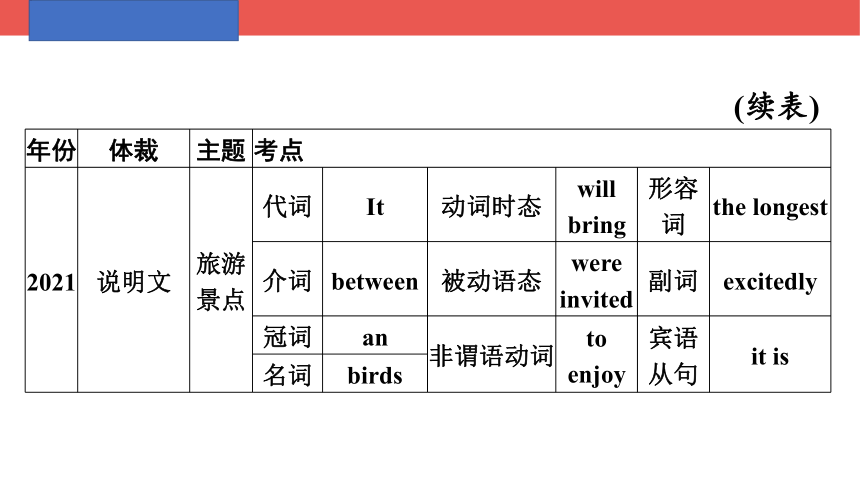
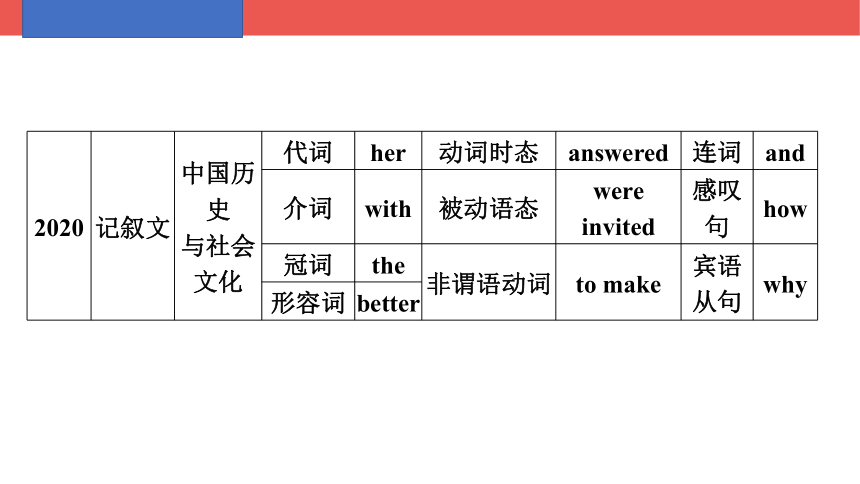
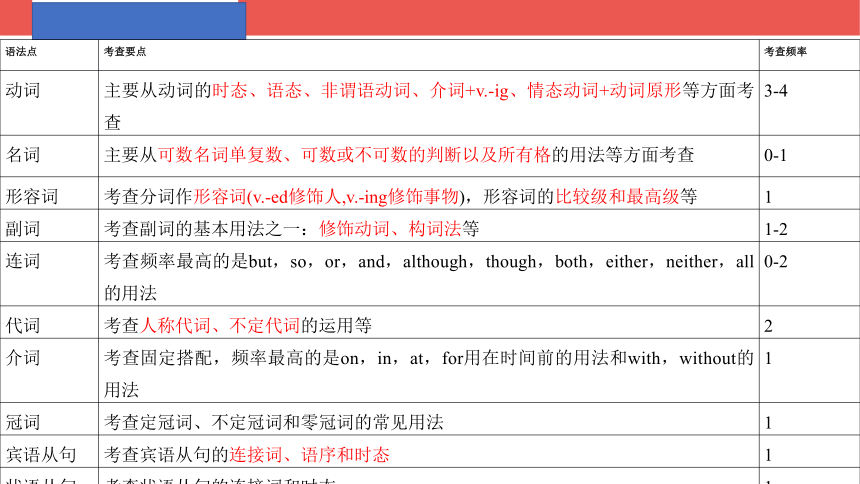
文档简介
(共36张PPT)
第四部分 中考题型突破
一 语法选择
一、 题型分析
语法选择是2020年广东省中考新增的题型, 旨在考查学生在实际情景中运用语法知识的能力, 着重在语篇的层面考查学生的语法分析能力, 强调语法知识在实际语言中的正确运用。
题型特点如下:
1. 选用材料篇幅一般为180词左右, 主要为记叙文或说明文。
2. 考查形式是在一篇留有10个空的短文中, 要求考生按照语法规则和上下文语境选择正确答案, 每空1分, 共10分。 从2022年起, 语法选择的选项从四个变成了三个, 选项的减少也降低了答题的难度。
3. 该题的语法规则考查范围相对固定、 考点相对明确, 且文章有特定语境, 因而难度不大, 中考难度系数大约在0.55左右。
4. 通常情况下, 语法选择的考查内容主要包括以下方面: 名词、 代词、 介词、 连词、 形容词和副词、 冠词、 数词、 情态动词、 时态、 被动语态、 非谓语动词、 宾语从句、 定语从句和感叹句等。 对定语从句知识点的考查, 只要求能辨认出由that、 which、 who引导的限定性定语从句, 并能理解句子的意思。 近年中考语法选择没有考查过该知识点, 近年来出题也偏向难度降低, 因此不必盲目拔高定语从句的难度, 其考查也着重于阅读文章的理解中。
5. 观察近几年考点可知, 部分考点如非谓语动词和动词的被动语态的考查点几乎是一致的, 但切忌大意, 还是需要认真审题和检查, 确保拿下这几个考点的分数。
2020—2024年广东省中考语法选择考情分析
年份 体裁 主题 考点 2024 记叙文 理财意识 名词 hour’s 动词时态 got 基本句型 There be
介词 / 被动语态 is given
冠词 a 非谓语动词 to buy 宾语从句 how
形容词 exciting/as early as
2020—2024年广东省中考语法选择考情分析
年份 体裁 主题 考点 2023 记叙文 航天梦想 代词 his 动词时态 is studying 连词 and
介词 in 被动语态 were invited 感叹句 How
冠词 a 非谓语动词 to leave 宾语从句 why
形容词 greater
2022 记叙文 个人成长 代词 her 动词时态 told 名词 teacher’s
介词 in 被动语态 were asked 连词 when 冠词 a 非谓语动词 to take 副词 successfully hard
(续表)
年份 体裁 主题 考点 2021 说明文 旅游景点 代词 It 动词时态 will bring 形容词 the longest
介词 between 被动语态 were invited 副词 excitedly
冠词 an 非谓语动词 to enjoy 宾语从句 it is
名词 birds
2020 记叙文 中国历史 与社会文化 代词 her 动词时态 answered 连词 and
介词 with 被动语态 were invited 感叹句 how
冠词 the 非谓语动词 to make 宾语从句 why
形容词 better
语法点 考查要点 考查频率
动词 主要从动词的时态、语态、非谓语动词、介词+v.-ig、情态动词+动词原形等方面考查 3-4
名词 主要从可数名词单复数、可数或不可数的判断以及所有格的用法等方面考查 0-1
形容词 考查分词作形容词(v.-ed修饰人,v.-ing修饰事物),形容词的比较级和最高级等 1
副词 考查副词的基本用法之一:修饰动词、构词法等 1-2
连词 考查频率最高的是but,so,or,and,although,though,both,either,neither,all的用法 0-2
代词 考查人称代词、不定代词的运用等 2
介词 考查固定搭配,频率最高的是on,in,at,for用在时间前的用法和with,without的用法 1
冠词 考查定冠词、不定冠词和零冠词的常见用法 1
宾语从句 考查宾语从句的连接词、语序和时态 1
状语从句 考查状语从句的连接词和时态 1
二、 解题策略
做题前: 快速浏览全文, 掌握语篇主旨大意和语篇特点, 以便在语境中选择正确的答案。
做题时:以句子为单位, 理解句意后, 找准考点, 弄清楚考查方向和意图, 找出对答案有提示作用的单词、 短语等。
做题后:要把答案代入空格中, 复读全文, 看看全文意思是否贯通, 检查人称、 时态、 数等是否前后一致, 最后确定答案。
考点一:动词
1、看句子中有无动词时态标志。一般通过读( )就可以根据动词的形式判断文章故事发生的( ),所以阅读第一句话,你的注意力应放在的( )形式上。注意有些句子的固定结构,或者某些明显的时间状语暗示了动词要使用的时态。
2、看该空格前有无情态动词或介词。如果空格前有情态动词,空格处则填( );如果空格前有介词,空格处则填( )形式。
3、看空格所在句子中有无并列连词and或or。如果句中有and或or,则要观察and或or前面或后面的( )与其保持一致。
4、看给出的空格选项中是否出现被动语态。如果有被动语态的选项则要判断主语与动词的关系是( )还是( )。
第一句话
时间
动词
动词原形
v.-ing
动词形式
主动
被动
一般现在时的标志词:频度副词( )
一般过去时的标志词:( )
一般将来时的标志词:( )
现在进行时的标志词:( )
过去进行时的标志词:( )
现在完成时的标志词:( )
sometimes, often),every day / week/ month/ year
last 、yesterday、ago等
next week /month / year 、in + 一段时间、tomorrow等
now、listen、smell、look等
at 8 o'clock yesterday、at that time、then
already 、ever、yet、never、since、for+一段时间
【例1】Judie thought for a moment and________, “Butterflies.”
A. answers B. answered C. will answer
【例2】Grandma ________ in the chair by the window when she opened one little eye.
A.sleep B. is sleeping C.was sleeping
B
C
2.动词非谓语: to do 、doing、done、do
(1) V+doing/to do
(2) prep(in,on,at,about,with,for,of) +doing
(3)情态动词(can,could,will,would,should,may,need,must)+do
(4)助动词(do,does,did)+do
(5)be+doing/done
(6)have/has/had +done
【注意】
(1)make、let sb do sth
(2)look forward to doing 、be used to doing 、pay attention to doing
【例3】I expect each of you_______a kite that means something important to you.
A. make B. to make C. making
【例4】Life is like this too. The rough roads we travel along can also________ us.
A.to help B.help C.helps
【例5】Perhaps they dreamed of________ the universe
A.explored B.to explore C.exploring
B
B
D
3.情态动词:
情态动词(can,may,might ,must ,should等)+动词原形
can 可以(表能力,表请求)
might 可能(表推测,可能性较小)
must 必须(表命令),一定(表推测)
should 应该(表建议)
need 需要(表建议)
can't 不可能(表推测),不可以(表命令),不能(表能力)
mustn't 禁止,一定不要(表示命令)
【例6】In the beginning, his violin was so cheap and badly made that he _____not play it well.
A.need B.may C.could
【例7】“We _____ be nice to the old, George,”his mother always told him.
A.should B.would C.can
C
A
4.被动语态:
一般现在时的被动语态:am/is/are +done
一般过去时的被动语态:was/were +done
一般将来时的被动语态:will be +done
【关键点】时态(现在/过去/将来)+语态(主动/被动)
【例8】As soon as he reads one book, he brings home another. Soon the house ____ books.
A.fills with B.filled with C.is filled with
【例9】In 1940, Xian ____ to the Soviet Union to write music for movies.
A.sent B.was sent C.has sent
C
B
二、冠词题
a: 意为“一个”,用于辅音开头的单词前
an: 意为“一个”,用于元音开头的单词前
the: 意为“那个,这个”,用于特指/前面提到的名词前
【例10】His father was a farmer, and farm they lived on was miles away from anywhere .
A.a B.an C.the
【例11】As the other villagers were working, he walked around the village laughing and talking ____ villagers thought he was lazy,
A.a B.an C.the
C
C
考点三:名词/感叹句
名词的单复数的考查,常常结合感叹句来考查。用感叹句的判定方法即在句子后面找出主语与谓语,若空格后的词是形容词则选( )选项,如是名词且判断该名词为可数名词单数则用( )选项,若是可数名词复数或不可数名词则( )用选项。
考点四:形容词 考点五:副词
修饰名词:( )
修饰动词:( )
原级标志词:( )
比较级标志词:( )
最高级标志词:( )
how
what a
what
选形容词
选副词(常以ly结尾)
as...as、not so/as ...as 、pretty,very
than、much、a little 、even
in、of、among、序数词
【例】she cried proudly. “_______high my butterfly flies!”
A. What B. What a C. How
【例】_______ honest boy he is !”
A. How B. What a C. What an
【例】Scientists wanted to make travelling to space as _______as possible for humans.
A.safe B.safer C.safest
【例】The children hold their books close as they say good-bye and run home _______.
A.cheer B.cheerful C.cheerfully
【例】You will have a_______understanding of kites than before.”
A. good B. better C. best
C
C
A
C
B
考点六:连词
考查频率最高的是but,so,or,and,though,although,both,either,neither,all的用法。判断文章前后的逻辑关系即可。but表示转折关系,so表示因果关系,or表示“或者、否则”之意。and表示并列关系;though/although表示“虽然”,但是不能与but连用。both...and表示“两者都”;either...or表示“两者之一”;neither...nor表示“两者都不”;all表示“全部都”,用于三者以上。
考点七:代词
1、人称代词在动词或介词后用宾格;空格后有名词则用形容词性物主代词,没有名词则用名词性物主代词。
2、反身代词常考enjoy oneself/help yourself/dress oneself/teach oneself。
3、不定代词something,everything,anything,nothing被形容词修饰时,形容词后置。
4、other.,the other,分别为“其他的”“其余的”的意思,后面跟名词;others,the others分别为“其他人/东西”“其余的人/东西”,已经是名词。有the,说明是在一定范围内。
【例】After asking the man how he did it, they understood he was not lazy,_____very clever.
A.so B.and C.or
【例】 Xian became the school's best student _____won several prizes for his talents.
A.and B.but C.as
【例】_____there were no pianos in Yan'an at that time, Xian still wrote most of his most important music there, including The Yellow River Cantata, his most famous work.
A.If B.Although C.When
B
B
A
【例】They worried that this man would never get______potatoes ready in time
A.he B.him C.his
【例】He did everything well and lived for______16 years.
A.another B.other C.others
【例】Candles burn as the children read borrowed books deep into their night,_______.
A.either B.neither C.too
【例】I can bring my books into the faraway hills and share _______I have with the children.”
A.what B.who C.why
C
A
C
A
考点八:介词
常考on,in,at,for用在时间前的用法和with,without的用法。
at:用于具体时刻、传统节日前,例如:at8:00,at Christmas。固定搭配有at noon,at night等。
in:用于世纪、年、季节、月等不具体的时间前,例如:in2011。固定搭配:in the morning/afternoon/evening等。
on:用于具体的某一天,或具体某天的早上、下午、晚上。
for:后面跟一段时间,是现在完成时的标志。
with:与…一起;和…;带着…;有…的;以…(手段、材料);用…(工具)。
without:.没有。
【例】Early______a sunny morning, David and his donkeys stop at a river.
A.in B.on C.at
【例】His story ended happily when he returned to Earth______very good health.
A.at B.on C.in
B
C
三、 广东省中考语法选择真题详解
David is a 15 year old boy and he is crazy about space. He always wonders how space stations work. For him, a space camp is 31 than any other camp in the world.
( ) 31. A. great B. greater C. the greatest
B
greater
At the age of seven, David had 32 first astronaut (宇航员) training experience. He and his parents 33 to a Family Space Camp. They had a taste of what it was like to travel 34 space. Everything was magical. 35 excited David was!
( ) 32. A. he B. him C. his
( ) 33. A. invited B. are invited C. were invited
( ) 34. A. on B. in C. for
( ) 35. A. How B. What C. What an
C
C
B
A
his
were invited
in
How
David has been to many space camps over the last eight years. Last month, he went to 36 new space camp. It had a lot of fun training programs, 37 he enjoyed all of them. There he was often asked 38 he liked space camps so much. “I feel like a real astronaut in the space camp, and I don’t even need 39 the earth,” he said.
( ) 36. A. a B. an C. the
( ) 37. A. or B. but C. and
( ) 38. A. why B. when C. where
( ) 39. A. leave B. leaving C. to leave
A
C
A
C
a
and
why
to leave
These experiences have influenced his life. Now David 40 space science. He has made up his mind to be a space engineer in the future.
( ) 40. A. study B. is studying C. was studying
B
study
When I was a little boy, I always ran outside to play for a few hours on weekends. Then I came back home. 1 lovely the house smelt!
It was 2 Italian grandma making our Sunday dinner. There was Italian bread 3 butter. There were meatballs, sometimes potatoes and sometimes chicken. I remember we all got together around the table. Then we ate with smiles, laughter, and joy. I always felt so 4 and safe there. We always left dinner with happy hearts.
1.A.What B.What a C.How
2.A.I B.my C.mine
3.A.with B.for C.in
4.A.peace B.peaceful C.peacefully
语法选择
As I got older and became an adult myself, I made efforts 5 something like Grandma’s Sunday dinners. Often I would get very close to making a dinner like hers, but it was never quite right. Then I realized 6 I was doing something wrong. 7 I was trying to bring back a taste, what I really wanted to do was to bring back a feeling.
5.A.cook B.to cook C.cooking
6.A.why B.when C.that
7.A.If B.Unless C.Although
8.A.prepared B.were prepared C.are prepared
9.A.a B.an C.the
10.A.do B.have done C.did
Those dinners which 8 by my grandma were so wonderful. But that’s not 9 most important. What really matters is the feeling of love. Grandma always put her love into her cooking and her life. Since then I 10 my best to do the same. No matter what I am cooking or what I am doing, I always try to do it with love.
第四部分 中考题型突破
一 语法选择
一、 题型分析
语法选择是2020年广东省中考新增的题型, 旨在考查学生在实际情景中运用语法知识的能力, 着重在语篇的层面考查学生的语法分析能力, 强调语法知识在实际语言中的正确运用。
题型特点如下:
1. 选用材料篇幅一般为180词左右, 主要为记叙文或说明文。
2. 考查形式是在一篇留有10个空的短文中, 要求考生按照语法规则和上下文语境选择正确答案, 每空1分, 共10分。 从2022年起, 语法选择的选项从四个变成了三个, 选项的减少也降低了答题的难度。
3. 该题的语法规则考查范围相对固定、 考点相对明确, 且文章有特定语境, 因而难度不大, 中考难度系数大约在0.55左右。
4. 通常情况下, 语法选择的考查内容主要包括以下方面: 名词、 代词、 介词、 连词、 形容词和副词、 冠词、 数词、 情态动词、 时态、 被动语态、 非谓语动词、 宾语从句、 定语从句和感叹句等。 对定语从句知识点的考查, 只要求能辨认出由that、 which、 who引导的限定性定语从句, 并能理解句子的意思。 近年中考语法选择没有考查过该知识点, 近年来出题也偏向难度降低, 因此不必盲目拔高定语从句的难度, 其考查也着重于阅读文章的理解中。
5. 观察近几年考点可知, 部分考点如非谓语动词和动词的被动语态的考查点几乎是一致的, 但切忌大意, 还是需要认真审题和检查, 确保拿下这几个考点的分数。
2020—2024年广东省中考语法选择考情分析
年份 体裁 主题 考点 2024 记叙文 理财意识 名词 hour’s 动词时态 got 基本句型 There be
介词 / 被动语态 is given
冠词 a 非谓语动词 to buy 宾语从句 how
形容词 exciting/as early as
2020—2024年广东省中考语法选择考情分析
年份 体裁 主题 考点 2023 记叙文 航天梦想 代词 his 动词时态 is studying 连词 and
介词 in 被动语态 were invited 感叹句 How
冠词 a 非谓语动词 to leave 宾语从句 why
形容词 greater
2022 记叙文 个人成长 代词 her 动词时态 told 名词 teacher’s
介词 in 被动语态 were asked 连词 when 冠词 a 非谓语动词 to take 副词 successfully hard
(续表)
年份 体裁 主题 考点 2021 说明文 旅游景点 代词 It 动词时态 will bring 形容词 the longest
介词 between 被动语态 were invited 副词 excitedly
冠词 an 非谓语动词 to enjoy 宾语从句 it is
名词 birds
2020 记叙文 中国历史 与社会文化 代词 her 动词时态 answered 连词 and
介词 with 被动语态 were invited 感叹句 how
冠词 the 非谓语动词 to make 宾语从句 why
形容词 better
语法点 考查要点 考查频率
动词 主要从动词的时态、语态、非谓语动词、介词+v.-ig、情态动词+动词原形等方面考查 3-4
名词 主要从可数名词单复数、可数或不可数的判断以及所有格的用法等方面考查 0-1
形容词 考查分词作形容词(v.-ed修饰人,v.-ing修饰事物),形容词的比较级和最高级等 1
副词 考查副词的基本用法之一:修饰动词、构词法等 1-2
连词 考查频率最高的是but,so,or,and,although,though,both,either,neither,all的用法 0-2
代词 考查人称代词、不定代词的运用等 2
介词 考查固定搭配,频率最高的是on,in,at,for用在时间前的用法和with,without的用法 1
冠词 考查定冠词、不定冠词和零冠词的常见用法 1
宾语从句 考查宾语从句的连接词、语序和时态 1
状语从句 考查状语从句的连接词和时态 1
二、 解题策略
做题前: 快速浏览全文, 掌握语篇主旨大意和语篇特点, 以便在语境中选择正确的答案。
做题时:以句子为单位, 理解句意后, 找准考点, 弄清楚考查方向和意图, 找出对答案有提示作用的单词、 短语等。
做题后:要把答案代入空格中, 复读全文, 看看全文意思是否贯通, 检查人称、 时态、 数等是否前后一致, 最后确定答案。
考点一:动词
1、看句子中有无动词时态标志。一般通过读( )就可以根据动词的形式判断文章故事发生的( ),所以阅读第一句话,你的注意力应放在的( )形式上。注意有些句子的固定结构,或者某些明显的时间状语暗示了动词要使用的时态。
2、看该空格前有无情态动词或介词。如果空格前有情态动词,空格处则填( );如果空格前有介词,空格处则填( )形式。
3、看空格所在句子中有无并列连词and或or。如果句中有and或or,则要观察and或or前面或后面的( )与其保持一致。
4、看给出的空格选项中是否出现被动语态。如果有被动语态的选项则要判断主语与动词的关系是( )还是( )。
第一句话
时间
动词
动词原形
v.-ing
动词形式
主动
被动
一般现在时的标志词:频度副词( )
一般过去时的标志词:( )
一般将来时的标志词:( )
现在进行时的标志词:( )
过去进行时的标志词:( )
现在完成时的标志词:( )
sometimes, often),every day / week/ month/ year
last 、yesterday、ago等
next week /month / year 、in + 一段时间、tomorrow等
now、listen、smell、look等
at 8 o'clock yesterday、at that time、then
already 、ever、yet、never、since、for+一段时间
【例1】Judie thought for a moment and________, “Butterflies.”
A. answers B. answered C. will answer
【例2】Grandma ________ in the chair by the window when she opened one little eye.
A.sleep B. is sleeping C.was sleeping
B
C
2.动词非谓语: to do 、doing、done、do
(1) V+doing/to do
(2) prep(in,on,at,about,with,for,of) +doing
(3)情态动词(can,could,will,would,should,may,need,must)+do
(4)助动词(do,does,did)+do
(5)be+doing/done
(6)have/has/had +done
【注意】
(1)make、let sb do sth
(2)look forward to doing 、be used to doing 、pay attention to doing
【例3】I expect each of you_______a kite that means something important to you.
A. make B. to make C. making
【例4】Life is like this too. The rough roads we travel along can also________ us.
A.to help B.help C.helps
【例5】Perhaps they dreamed of________ the universe
A.explored B.to explore C.exploring
B
B
D
3.情态动词:
情态动词(can,may,might ,must ,should等)+动词原形
can 可以(表能力,表请求)
might 可能(表推测,可能性较小)
must 必须(表命令),一定(表推测)
should 应该(表建议)
need 需要(表建议)
can't 不可能(表推测),不可以(表命令),不能(表能力)
mustn't 禁止,一定不要(表示命令)
【例6】In the beginning, his violin was so cheap and badly made that he _____not play it well.
A.need B.may C.could
【例7】“We _____ be nice to the old, George,”his mother always told him.
A.should B.would C.can
C
A
4.被动语态:
一般现在时的被动语态:am/is/are +done
一般过去时的被动语态:was/were +done
一般将来时的被动语态:will be +done
【关键点】时态(现在/过去/将来)+语态(主动/被动)
【例8】As soon as he reads one book, he brings home another. Soon the house ____ books.
A.fills with B.filled with C.is filled with
【例9】In 1940, Xian ____ to the Soviet Union to write music for movies.
A.sent B.was sent C.has sent
C
B
二、冠词题
a: 意为“一个”,用于辅音开头的单词前
an: 意为“一个”,用于元音开头的单词前
the: 意为“那个,这个”,用于特指/前面提到的名词前
【例10】His father was a farmer, and farm they lived on was miles away from anywhere .
A.a B.an C.the
【例11】As the other villagers were working, he walked around the village laughing and talking ____ villagers thought he was lazy,
A.a B.an C.the
C
C
考点三:名词/感叹句
名词的单复数的考查,常常结合感叹句来考查。用感叹句的判定方法即在句子后面找出主语与谓语,若空格后的词是形容词则选( )选项,如是名词且判断该名词为可数名词单数则用( )选项,若是可数名词复数或不可数名词则( )用选项。
考点四:形容词 考点五:副词
修饰名词:( )
修饰动词:( )
原级标志词:( )
比较级标志词:( )
最高级标志词:( )
how
what a
what
选形容词
选副词(常以ly结尾)
as...as、not so/as ...as 、pretty,very
than、much、a little 、even
in、of、among、序数词
【例】she cried proudly. “_______high my butterfly flies!”
A. What B. What a C. How
【例】_______ honest boy he is !”
A. How B. What a C. What an
【例】Scientists wanted to make travelling to space as _______as possible for humans.
A.safe B.safer C.safest
【例】The children hold their books close as they say good-bye and run home _______.
A.cheer B.cheerful C.cheerfully
【例】You will have a_______understanding of kites than before.”
A. good B. better C. best
C
C
A
C
B
考点六:连词
考查频率最高的是but,so,or,and,though,although,both,either,neither,all的用法。判断文章前后的逻辑关系即可。but表示转折关系,so表示因果关系,or表示“或者、否则”之意。and表示并列关系;though/although表示“虽然”,但是不能与but连用。both...and表示“两者都”;either...or表示“两者之一”;neither...nor表示“两者都不”;all表示“全部都”,用于三者以上。
考点七:代词
1、人称代词在动词或介词后用宾格;空格后有名词则用形容词性物主代词,没有名词则用名词性物主代词。
2、反身代词常考enjoy oneself/help yourself/dress oneself/teach oneself。
3、不定代词something,everything,anything,nothing被形容词修饰时,形容词后置。
4、other.,the other,分别为“其他的”“其余的”的意思,后面跟名词;others,the others分别为“其他人/东西”“其余的人/东西”,已经是名词。有the,说明是在一定范围内。
【例】After asking the man how he did it, they understood he was not lazy,_____very clever.
A.so B.and C.or
【例】 Xian became the school's best student _____won several prizes for his talents.
A.and B.but C.as
【例】_____there were no pianos in Yan'an at that time, Xian still wrote most of his most important music there, including The Yellow River Cantata, his most famous work.
A.If B.Although C.When
B
B
A
【例】They worried that this man would never get______potatoes ready in time
A.he B.him C.his
【例】He did everything well and lived for______16 years.
A.another B.other C.others
【例】Candles burn as the children read borrowed books deep into their night,_______.
A.either B.neither C.too
【例】I can bring my books into the faraway hills and share _______I have with the children.”
A.what B.who C.why
C
A
C
A
考点八:介词
常考on,in,at,for用在时间前的用法和with,without的用法。
at:用于具体时刻、传统节日前,例如:at8:00,at Christmas。固定搭配有at noon,at night等。
in:用于世纪、年、季节、月等不具体的时间前,例如:in2011。固定搭配:in the morning/afternoon/evening等。
on:用于具体的某一天,或具体某天的早上、下午、晚上。
for:后面跟一段时间,是现在完成时的标志。
with:与…一起;和…;带着…;有…的;以…(手段、材料);用…(工具)。
without:.没有。
【例】Early______a sunny morning, David and his donkeys stop at a river.
A.in B.on C.at
【例】His story ended happily when he returned to Earth______very good health.
A.at B.on C.in
B
C
三、 广东省中考语法选择真题详解
David is a 15 year old boy and he is crazy about space. He always wonders how space stations work. For him, a space camp is 31 than any other camp in the world.
( ) 31. A. great B. greater C. the greatest
B
greater
At the age of seven, David had 32 first astronaut (宇航员) training experience. He and his parents 33 to a Family Space Camp. They had a taste of what it was like to travel 34 space. Everything was magical. 35 excited David was!
( ) 32. A. he B. him C. his
( ) 33. A. invited B. are invited C. were invited
( ) 34. A. on B. in C. for
( ) 35. A. How B. What C. What an
C
C
B
A
his
were invited
in
How
David has been to many space camps over the last eight years. Last month, he went to 36 new space camp. It had a lot of fun training programs, 37 he enjoyed all of them. There he was often asked 38 he liked space camps so much. “I feel like a real astronaut in the space camp, and I don’t even need 39 the earth,” he said.
( ) 36. A. a B. an C. the
( ) 37. A. or B. but C. and
( ) 38. A. why B. when C. where
( ) 39. A. leave B. leaving C. to leave
A
C
A
C
a
and
why
to leave
These experiences have influenced his life. Now David 40 space science. He has made up his mind to be a space engineer in the future.
( ) 40. A. study B. is studying C. was studying
B
study
When I was a little boy, I always ran outside to play for a few hours on weekends. Then I came back home. 1 lovely the house smelt!
It was 2 Italian grandma making our Sunday dinner. There was Italian bread 3 butter. There were meatballs, sometimes potatoes and sometimes chicken. I remember we all got together around the table. Then we ate with smiles, laughter, and joy. I always felt so 4 and safe there. We always left dinner with happy hearts.
1.A.What B.What a C.How
2.A.I B.my C.mine
3.A.with B.for C.in
4.A.peace B.peaceful C.peacefully
语法选择
As I got older and became an adult myself, I made efforts 5 something like Grandma’s Sunday dinners. Often I would get very close to making a dinner like hers, but it was never quite right. Then I realized 6 I was doing something wrong. 7 I was trying to bring back a taste, what I really wanted to do was to bring back a feeling.
5.A.cook B.to cook C.cooking
6.A.why B.when C.that
7.A.If B.Unless C.Although
8.A.prepared B.were prepared C.are prepared
9.A.a B.an C.the
10.A.do B.have done C.did
Those dinners which 8 by my grandma were so wonderful. But that’s not 9 most important. What really matters is the feeling of love. Grandma always put her love into her cooking and her life. Since then I 10 my best to do the same. No matter what I am cooking or what I am doing, I always try to do it with love.
同课章节目录
- 词法
- 名词
- 动词和动词短语
- 动词语态
- 动词时态
- 助动词和情态动词
- 非谓语动词
- 冠词
- 代词
- 数词和量词
- 形容词副词及其比较等级
- 介词和介词短语
- 连词和感叹词
- 构词法
- 相似、相近词比较
- 句法
- 陈述句
- 一般疑问句和否定疑问句
- 特殊疑问句及选择疑问句
- 反意疑问句
- 存在句(There be句型)
- 宾语从句
- 定语从句
- 状语从句
- 主谓一致问题
- 简单句
- 并列句
- 复合句
- 主谓一致
- 主、表语从句
- 名词性从句
- 直接引语和间接引语
- 虚拟语气
- 感叹句
- 强调句
- 倒装句
- 祈使句
- 句子的成分
- 句子的分类
- 题型专区
- 单项选择部分
- 易错题
- 完形填空
- 阅读理解
- 词汇练习
- 听说训练
- 句型转换
- 补全对话
- 短文改错
- 翻译
- 书面表达
- 任务型阅读
- 语法填空
- 其他资料
